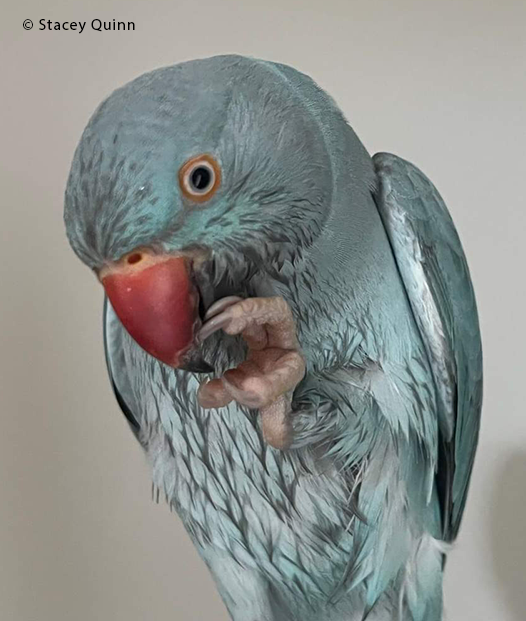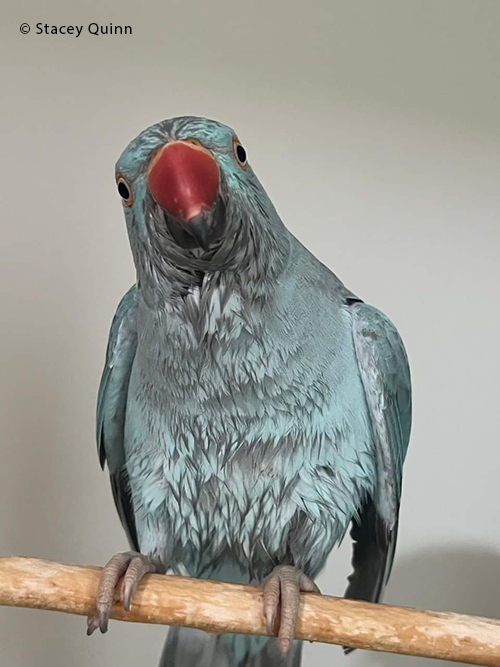My Indian ringneck is almost two, he is well fed and loved. He is always out of the cage and has plenty of toys which I alternate. Very recently, he has started a new habit of screaming nonstop. My neighbors don’t mind the chirps but lately he doesn’t stop screaming and I’m worried it may become too annoying for the neighbors. Any idea how I can work with him to stop or why he is doing this? He never used to. It’s a new thing.
Thank you
Let me start by saying that ringnecks are loud in general. Unfortunately, this is something that many new ringneck owners do not realize. These creatures are designed to be loud and are sentinels. If you ever had the pleasure of seeing these parrots in the wild, flock mates will excessively call to ensure their “network” of communication remains intact—this means continually calling out to each other to keep the flock together. In addition, these birds are often excessively making high shrill calls when danger is around. Your ringneck is mimicking such behavior likely. For this reason, it is unlikely vocalizations will cease entirely, but there are some things that you can do to help minimize the vocalizations.
Ensure the parrot has forging toys to help keep the bird occupied. These forging toys make the birds work for their desired treats or preferred items. Hopefully, this will keep the bird engaged and interested in trying to solve these toys rather than scream. These forging toys can be puzzles or a large bin with shredded paper that contain items hidden throughout it. Be creative as every ringneck is different in regards to what they will forage for and their preferred items. These birds spend a great deal of their time forging daily, and therefore we as the owner should mimic this behavior. Allowing the bird to forage will help avoid becoming bored, leading to excessive screaming.
The environment plays a huge factor in the noise level of the bird. It is assumed there is one bird within the household. If this is the case, modifying the environment’s noise may make a huge difference. For instance, ringnecks tend to be noisier when the TV is running, a radio is on, or there is excessive noise within the household. If this is the case, modify the environment to help keep the surroundings quieter.
Reward the bird when it is quiet. Shaping the bird’s behavior is important. If a behavior is not desired, you should ignore it completely as an owner. The ultimate goal is that not reinforcing the undesirable behavior will extinguish it. Only reward the bird when it is quiet by giving it treats and lots of praise. Again, remember that ringnecks are very acute to their environment and flock mates. Even giving the ringneck eye contact or looking in its direction may reinforce the undesired behavior. Sometimes, owners may try to tell their bird “no” or “be quiet,” but unfortunately, that only reinforces the behavior. From the ringneck’s perspective, any vocalizations from its mate (you) are desirable. The behavior will be reinforced if the owner responds by either looking or providing the bird with vocalizations.
Keeping a log of when the bird is most vocal is also important. Most ringnecks will vocalize during the morning, around noon, and before sunset. It would help if you created a journal to log when your bird is most vocal and look for any environmental triggers that may result in such excessive noise levels. Having a journal will allow the owner to know when vocalizations are most likely. Once these vocalizations have been mapped out, the proper interventions can be implemented.
Perhaps something is triggering your bird, and he is alerting you of the danger? Again, it’s important to note these birds are sentinels. Every time they see danger, they alert their flock mates through significant shrill calls. These calls are used to keep the flock on guard and announce that danger is near. For this reason, look for any critters such as rodents, reptiles, or neighborhood pets. Often, we don’t notice these animals around our birds; however, ringnecks are highly sharp to their environment as their lives depend upon it.
Finally, the ringneck sound very similar to the neighborhood birds. They don’t have a screech or unique calls like a conure or macaw. For this reason, it is likely the neighbors will not be able to identify the bird. That being said, if you’re concerned about ensuring your neighbors do not become annoyed, try communicating with them. Let them know that you are working through some behavior strategies to help reduce your bird’s vocalizations. Another approach would be to move the bird into an area where neighbors are not so close. I hope this helps!
Best wishes,
IMRAN-C
Looking for help, don’t hesitate to e-mail me at indianringnecks@gmail.com or post on our forum.



Hi Imran
That is amazing advice thank you
I know that Indian Ringnecks are loud birds and I don’t mind this at all. Its the excessive ongoing screaming that concerns me. That being said I will take your advice on board and implement it. Hopefully that helps. Thank you once again. Much appreciated. Stacey
My Ringneck came to me from a noisy household. She was constantly competing with TV, music, video games, children and dogs and her screeching got so loud they decided to rehome her. Since being with me, nearly a year now, she only screeches in the morning before I get up (I ignore this and don’t uncover her cage until she is quiet) or when her cage is outside and she communicates with the cockatiel across the road.
Her cage is near a window and she does screech to warn me if anyone comes near the house. I call her my guard bird. I guess that’s the sentinel behaviour.